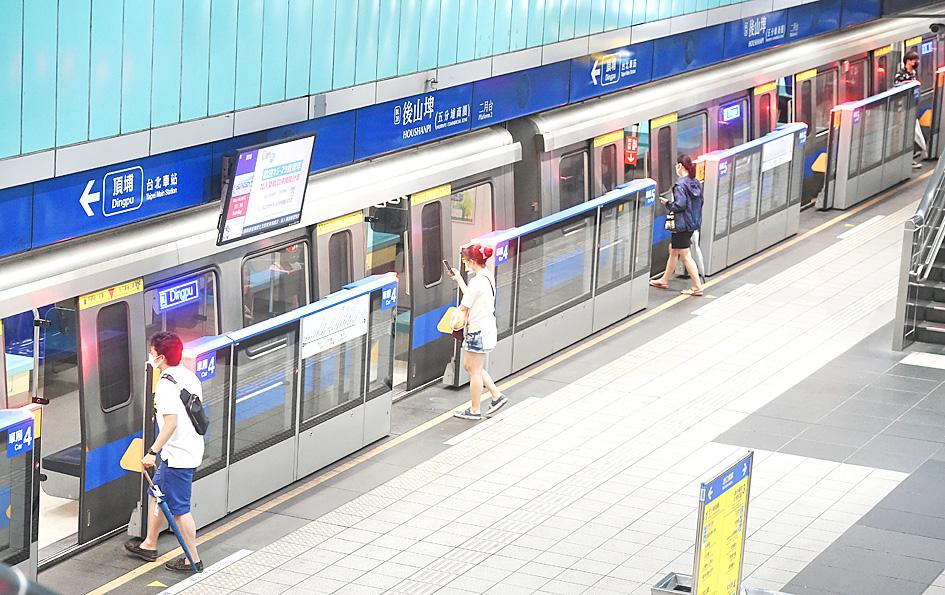The Taipei City Government yesterday conducted a simulation for a level 4 lockdown, which would close all nonessential businesses and bar entrance into the city.
The death toll from COVID-19 in Taiwan has surpassed that of SARS in a scene unfathomable at this time last year, Taipei Mayor Ko Wen-je (柯文哲) said.
There is evidence that the situation has stabilized over the past three days, as ambulances are no longer being turned away from hospitals due to a lack of beds, he said.

Photo: CNA
However, if the situation continues, “quantitative changes would create qualitative ones,” Ko said, asking what would happen if the city must lock down for months or if cases surge once more.
Therefore, the city must “plan for the worst to be best prepared,” he added.
In the simulation, participants led by Ko practiced mobilizing the city government to manage all levels of response with the goal of identifying problematic areas.
The first step would be commanding the Taipei Epidemic Command Center to remain open around the clock, while each administrative district would be instructed to set up disaster response centers, the city government said.
The city would also coordinate closely with the governments of Keelung, New Taipei City and Taoyuan, it said.
All schools and offices would be closed, and no one would be allowed to go outside except to buy food or seek medical treatment, or to perform other necessary or official duties, it added.
In addition, roadblocks would be erected to restrict movement between regions, the city said.
Seventy-one control points would be set up on access roads and highway ramps to restrict the flow of private vehicles into the city, while trains would not stop at stations within Taipei, it said.
All mass transit services would only operate within city limits, meaning that MRT service between Taipei and New Taipei City would be suspended, the city government said.
The YouBike service would also be suspended, it added.
Police would be dispatched for crowd control at markets, which would be instructed to restrict sales of certain items if supply becomes limited, it said.
About 21,000 essential businesses would be allowed to operate, including restaurants, bakeries, fruit and vegetable vendors, gas stations and supermarkets, it said.
Traditional markets would operate with limited hours, it added.
As for medical supplies, the city said it would seek assistance from the Ministry of Health and Welfare to establish backup hospitals and evaluate the potential of converting regional hospitals into specialized COVID-19 facilities.
It would also aim to provide 1,400 quarantine hotel rooms, it said.
If fatalities surpass the city’s daily cremation capacity of 224 bodies, temporary morgues could be established to store up to 200 bodies, it added.
Finally, the Taipei City Government said it would request assistance from the 6th Army Command 33rd Chemical Corps to sanitize the city, while 1,270 troops from the military’s disaster relief force could be deployed initially.

Taiwan has received more than US$70 million in royalties as of the end of last year from developing the F-16V jet as countries worldwide purchase or upgrade to this popular model, government and military officials said on Saturday. Taiwan funded the development of the F-16V jet and ended up the sole investor as other countries withdrew from the program. Now the F-16V is increasingly popular and countries must pay Taiwan a percentage in royalties when they purchase new F-16V aircraft or upgrade older F-16 models. The next five years are expected to be the peak for these royalties, with Taiwan potentially earning

STAY IN YOUR LANE: As the US and Israel attack Iran, the ministry has warned China not to overstep by including Taiwanese citizens in its evacuation orders The Ministry of Foreign Affairs (MOFA) yesterday rebuked a statement by China’s embassy in Israel that it would evacuate Taiwanese holders of Chinese travel documents from Israel amid the latter’s escalating conflict with Iran. Tensions have risen across the Middle East in the wake of US and Israeli airstrikes on Iran beginning Saturday. China subsequently issued an evacuation notice for its citizens. In a news release, the Chinese embassy in Israel said holders of “Taiwan compatriot permits (台胞證)” issued to Taiwanese nationals by Chinese authorities for travel to China — could register for evacuation to Egypt. In Taipei, the ministry yesterday said Taiwan

‘LIKE-MINDED PARTNER’: Tako van Popta said it would be inappropriate to delay signing the deal with Taiwan because of China, adding he would promote the issue Canadian senators have stressed Taiwan’s importance for international trade and expressed enthusiasm for ensuring the Taiwan-Canada trade cooperation framework agreement is implemented this year. Representative to Canada Harry Tseng (曾厚仁) in an interview with the Central News Agency (CNA) said he was increasingly uneasy about Ottawa’s delays in signing the agreement, especially as Ottawa has warmed toward Beijing. There are “no negotiations left. Not only [is it] initialed, we have three versions of the text ready: English, French and Mandarin,” Tseng said. “That tells you how close we are to the final signature.” Tseng said that he hoped Canadian Prime Minister Mark Carney

POSITIVE DEVELOPMENT: Japan and the US are expected to hold in-depth discussions on Taiwan-related issues during the meeting next month, Japanese sources said The holding of a Japan-US leaders’ meeting ahead of US President Donald Trump’s visit to China is positive news for Taiwan, former Japan-Taiwan Exchange Association representative Hiroyasu Izumi said yesterday. After the Liberal Democratic Party’s landslide victory in Japan’s House of Representatives election, Japanese Prime Minister Sanae Takaichi is scheduled to visit the US next month, where she is to meet with Trump ahead of the US president’s planned visit to China from March 31 to April 2 for a meeting with Chinese President Xi Jinping (習近平). Japan and the US are expected to hold in-depth discussions on Taiwan-related issues during the